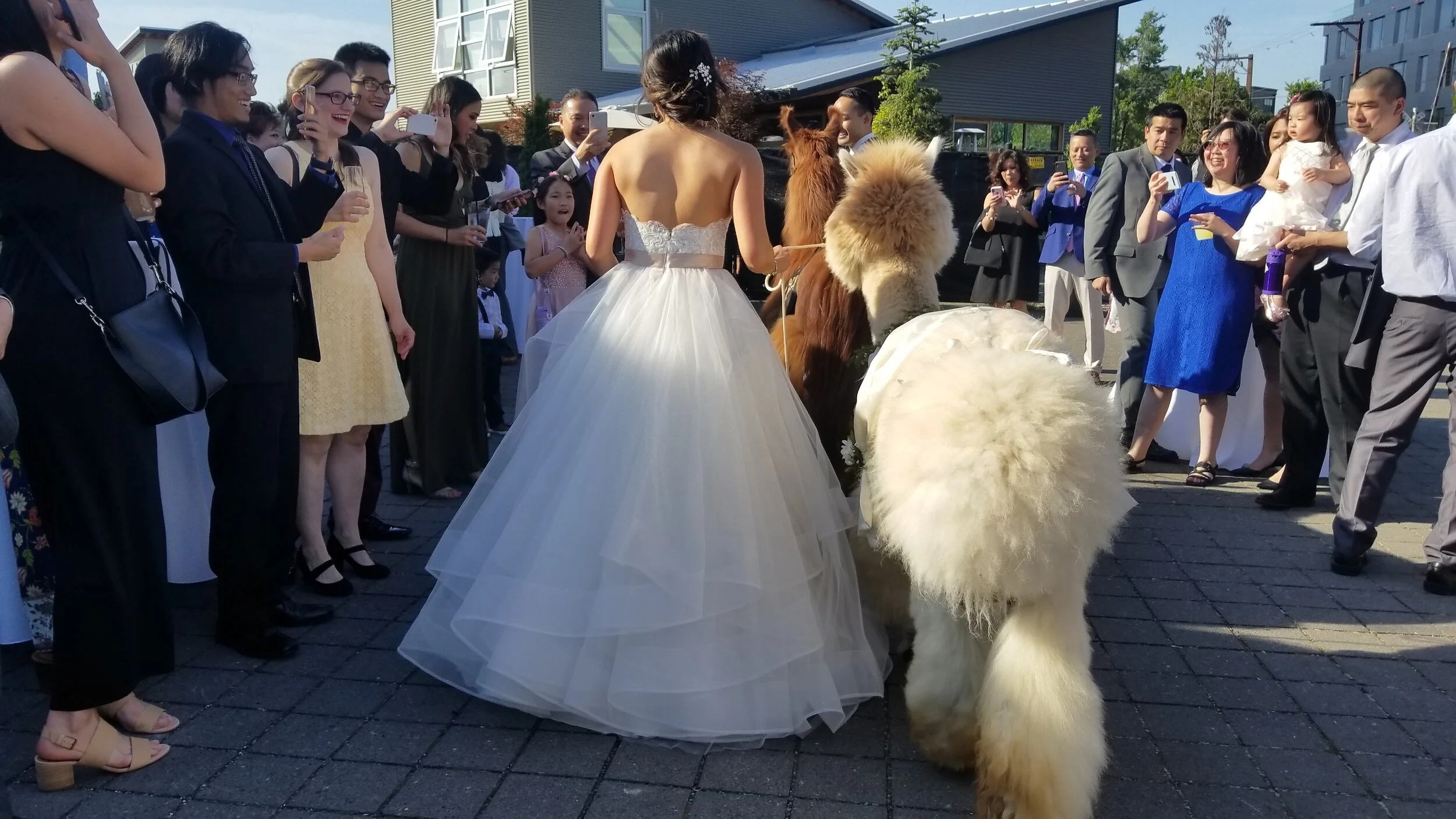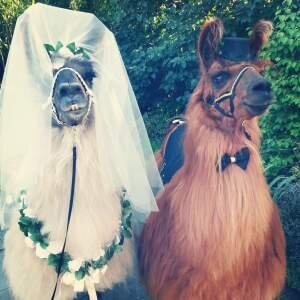Animal Safety
Parenting is different for every family. Raising pets is the same way. On our farm, we do things differently based on our experiences with our pet llamas and alpacas in our community.
**PLEASE REMEMBER** Llamas and alpacas are domesticated animals similar to horses and dogs. They have been bred to be working animals, more so the llama than alpaca, but they are domesticated and have been for thousands of years. What we do is not the same as riding elephants or taking photos with tigers, those animals are exotic. Read on for more information behind our training techniques.
We aren't afraid to cancel due to weather or any unsafe scenario.
When working with living, breathing creatures, we take seriously they cannot speak for themselves so we may need to for them. Because of this, we do not risk high heat scenarios or driving in unsafe conditions (including intense traffic as time off the farm could leave to potential stress). Every time we book an outing, we take into account potential stress. This includes looking into the variables of weather patterns throughout summer, driving patterns into/out of Portland on any given day, or how long we are asking each animal to be off the farm for. If there is a potential for stress, we will air on the side of caution and not go. This is why booking can sometimes be difficult when requesting within a 30-day window because so many variables need to be considered as to which animals are already leaving the farm that week, how long are they off the farm for, what is the predicted weather like.
What we have found over the course of our time sharing our animals, is that there are two methods of sharing animals off the farm that we feel comfortable with. One: to ask an animal to be off the farm for long periods of time with lots of farm rest in between each outing. Two: asking them to be off the farm more frequently, but each outing be for minimal amounts of time. It is our mission to touch many peoples lives, so we share multiple animals several times each week for minimal amounts of time, rarely ever asking any animal to be at a location for longer than two hours and we only travel up to one hour from our farm in Ridgefield, WA. This way, we can ensure we don't ask any animal to be off the farm longer than around four hours max. We also rotate animals almost daily to ensure each one only leaves the farm 2-4 times each week with lots of farm time in between. From our experience, this strategy gives us a healthy way to ensure we don't come close to our animal's stress level breaking point (yes, we have learned this from experience. At some point you see your animal stressed and in that scenario, we get them home, get them lots of rest, and change update our strategy to ensure we don't ask that of them or any animal again).
We train each animal around 2-years before asking very much of them.
Each llama/alpaca has a different personality and we respect that and use their own personality traits to help train them. We start training by seeing who they are. Do they enjoy being around people? Do they enjoy physical touch? Are they comfortable leaving the farm with you? These are things we offer positive-reinforcement for positive behavior in, if they show signs of positive reception. A great way we start with training, is by loaning our animals out to 4-H youth to learn how to train our animals and the animals get to learn to be social.
Once we have a llama/alpaca who is trusting to follow, stand still, enjoys being pet, takes carrots for rewards, and is comfortable leaving the farm by minivan, then we start baby-stepping their therapy training. Wedding are actually one of our favorite ways to baby-step our animals into being therapy animals. Guests are patient with one another because they are friends/family, the animals get one-on-one time with the couple and then an hour around guests before returning back to the farm. This allows them both quiet social moments and controlled chaos within strict time limits. Oddly enough, weddings and pre-schools are some of my #1 favorite spaces to introduce new animals to when I feel they have reached the social criteria to go into those spaces because of the controlled environments we can create. Ensuring our animals have positive experiences is the best way to have a reliable therapy llama/alpaca for all types of environments.
Here is a video of one of our "novice" animals (in early 2020) after 2 years of consecutive training (though we have owned him for 10 years) on a therapy visit:
We take the elements of crowds seriously.
Our animals are safe walking into/through crowds, or we wouldn't ask them to be there. It may take years for their comfort level to reach that, but it's worth the wait and training to ensure they aren't stressed when they do. We also understand how unique of an opportunity it is to hug a real llama/alpaca, so we arrange a line and allow each person, family, or small group, to have one-on-one sessions at a few minutes apiece. We come prepared with extra hands to assist in photo taking so folks can connect with our animals, extra voices to answer everyone's llama-llovin' questions, and help make everyone's time with our critters are smooth, easy, and safe for all. This also allows our animals to not get swarmed. Instead, even in a group of 500, only 1-4 people are interacting with our animals at any given time, allowing them to process each interaction safely.
Behind every camera is a line of folks learning about llamas while they wait.
In front of the camera are positive and controlled interactions to cherish.
The outfits our animals wear are not unusual and are custom-made for our animal's comfort.
A quick Google search for llama costumes will bring up a wonderful array of llamas covered in the most bizarre of attire. Traditionally, llamas have been domesticated for thousands of years and trained to carry packs on their backs, weighing between 50-100lbs. Others wear tassels on their heads and necks for photos ops in their South American cities and to show who's farm they belong to.
Here in the states, it is not unusual to see llama farmers decorate their animals up to add to the festivities of parades. That's how we got started. Our community of fellow llama farmers would dress our animals up as reindeer or with packs full of fake gifts on their backs for an annual holiday parade. After sharing our llama, Rojo, was a reindeer in the parade at a local nursing home, Lori was asked to bring him back dressed up to the residents could see his cute costume. With sheer delight, everyone's faces lit with joy to see Reindeer Rojo strutting through their hallways. Lori saw Valentine's Day decorations and thought, maybe the residents would enjoy a Valentine's Day outfit. Using the same specifications for her holiday attire, Lori sewed Rojo an outfit for Valentine's Day. Then St. Patty's, then Easter. Soon, folks were leaving their rooms to come see what Rojo was wearing each visit. There is a therapeutic aspect to our animal's silly attire that provokes excitement, joy, curiosity, and an instant sense of "that llama is a pet," which helps folks who have never met a llama before become more certain they want to pet him.
When attending a wedding for a military couple who's husband was about to be deployed, they were having a quick backyard wedding. The couple thought it would be cute to have the llamas dressed as bride and groom because they themselves wouldn't be dressed up. Now this photo goes viral on Reddit at least once each year and the beginning trend of Wedding Llamas was starting to form.
Our animals wear diapers.
Yes, you read that correctly. Our llama mama, Lori, hand-makes each "protective garment" custom for the animals that leave the farm. This isn't because our animals need to use them while we are off the farm, but rather to ensure each location we visit the security in knowing 100% that we won't leave anything behind. Llamas and alpacas are "communal pottiers" and typically prefer to relieve themselves in the comfort of their own farm. Since we don't usually ask our animals to be at weddings for longer than 90 minutes, this is a safe amount of time for them to feel comfortable off the farm and relieve themselves where they feel safe to do so - in their own pasture.
We know working with animals and sharing them with the public is a sensitive topic. We always respect concerns when it comes to the well-being of our animals and, as a community, those who work with animals should be transparent in the care and treatment of their pets - especially ones asked to be shared with the public. That is why we try our best to show behind the scenes through our Instagram account and welcome visitors to the farm on a regular basis. Feel free to follow along yourself to see how our farm runs and operates here on Instagram. We also had an interview sharing some behind the scenes care that can be seen and read here by Theresa Nunez.






